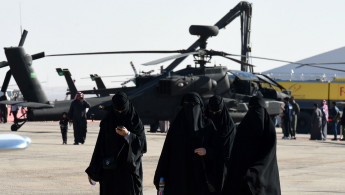First female Saudi air traffic controllers take to the tower
A group of 11 Saudi women completed a full year of courses in the traffic control management program dedicated to women at the Saudi Academy of Civil Aviation before being hired, according to local reports.
The company’s CEO Ryyan Tarabzoni said it was “prioritising the hiring of women in the profession, in line with improving women's rights in the country."
Aviation schools in the kingdom opened doors to Saudi women just weeks after authorities announced a historic move to lift a decades' long driving ban on women.
In early 2018, Eqbal Darandari, a member of the Saudi Shura Council–the kingdom's legislative body, called on national airlines to empower women by creating jobs.
"Airlines take one step forward and two steps back when it comes to pilot and flight attendant positions," Darandari said at the time.
"We've seen Saudi women piloting aircraft outside the kingdom. Now it's time for [Saudi Arabia’s aviation authority] to take the initiative. Saudi women deserve to find work in their own country."
Crown Prince Mohammed bin Salman's announcement last year that women would be allowed to drive from 24 June .
The move was hailed from some sections of international media, although others believe it failed to tackle real social issues in the kingdom.
Largely seen as the force behind the lifting of the ban, the crown prince's economic Vision 2030 reform plan - for a post-oil era - seeks to elevate women to nearly one-third of the workforce, up from about 22 percent now.
Analysts have warned that the reforms are merely cosmetic changes, allowing the kingdom to attract positive international publicity, while at the same time launching a huge crackdown on activists - including women's rights campaigners.
The kingdom's rigid guardianship system - which requires women to seek permission from a male relative to study - travel and other activities, also blocks the way for any real social change, warn Saudi activists.
Crackdown on women
Meanwhile, international rights group have continued to condemn the kingdom for its treatment of women activists, many of whom have been detained and tortured in prison.
Earlier this month, Human Rights Watch said Saudi Arabia detained up to 11 women almost a year ago after they made contact with foreign media and activists.
The group went on trial for undermining national security, according to HRW, and they still remain behind bars.
"After nearly a year of accusations... that these brave champions of women's rights are 'foreign agents', the actual charges against them appear to be simply a list of their efforts to promote women's rights," said Michael Page, HRW's Middle East deputy director.
"This is hardly the act of a government that is carrying out reforms, as (Crown Prince) Mohammed bin Salman and his supporters keep claiming."
The trial of at least 10 women opened in Riyadh's criminal court last week after they were detained in 2018 as part of a sweeping crackdown on activists, legal authorities said, without specifying the charges.
HRW and Amnesty International put the number of women facing trial at 11. Some of them have allegedly faced torture and sexual harassment during interrogation in detention.
Follow us on Twitter: @The_NewArab





 Follow the Middle East's top stories in English at The New Arab on Google News
Follow the Middle East's top stories in English at The New Arab on Google News
![Netanyahu furiously denounced the ICC [Getty]](/sites/default/files/styles/image_330x185/public/2024-11/GettyImages-2169352575.jpg?h=199d8c1f&itok=-vRiruf5)
![Both Hamas and the Palestinian Authority welcomed the ICC arrest warrants [Getty]](/sites/default/files/styles/image_330x185/public/2024-11/GettyImages-2178351173.jpg?h=199d8c1f&itok=TV858iVg)
